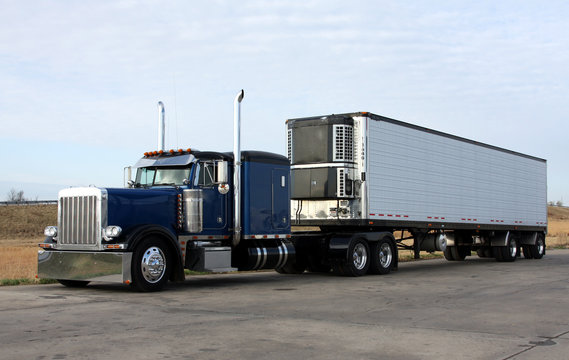Thermo King Truck Refrigeration Units: Ideal Options for Temperature Control
Thermo King Truck Refrigeration Units: Ideal Options for Temperature Control
Blog Article
Top Advancements in Transport Refrigeration: Enhancing Efficiency and Safety And Security
The landscape of transport refrigeration is going through considerable transformation, driven by advancements aimed at improving both performance and safety. As these developments proceed to evolve, it is essential to explore their ramifications on functional techniques and regulatory conformity, triggering a more detailed exam of how they reshape the future of transport refrigeration.
Smart Temperature Level Checking Systems
In the realm of transport refrigeration, wise temperature level surveillance systems have become an important innovation for guaranteeing the stability of temperature-sensitive products. These sophisticated systems take advantage of Web of Points (IoT) modern technology to give real-time information on temperature level fluctuations, making it possible for operators to keep optimum problems throughout the supply chain. By continually tracking the temperature of refrigerated containers and cars, business can swiftly identify inconsistencies that may compromise product top quality.

Moreover, smart tracking systems usually integrate automated alerts and alerts, enabling stakeholders to react promptly to any type of possible issues. This aggressive method not just minimizes the danger of perishing but likewise improves conformity with regulatory standards regulating food safety and security and pharmaceutical transportation.
The combination of data analytics within these systems also assists in predictive upkeep, aiding drivers to foresee prospective devices failings prior to they take place. This capacity minimizes downtime and maximizes operational efficiency, ultimately resulting in cost savings.
Eco-Friendly Refrigerants
Smart temperature level tracking systems play a vital function in preserving product top quality, but the efficiency of transport refrigeration likewise rests on the option of cooling agents used. As ecological concerns increase, the shift in the direction of green refrigerants has actually come to be necessary. Conventional cooling agents, such as hydrofluorocarbons (HFCs), are infamous for their high Global Warming Prospective (GWP), adding considerably to environment change. In contrast, emerging choices like hydrocarbon-based cooling agents and hydrofluoroolefins (HFOs) existing reduced GWP alternatives, supplying both performance and sustainability.
These environmentally friendly cooling agents not just lessen ecological effect yet additionally straighten with worldwide laws focused on phasing out hazardous substances. Their fostering can bring about improved energy performance, eventually lowering operating costs for transportation refrigeration systems. The usage of natural refrigerants, such as ammonia and carbon dioxide, has actually obtained grip due to their outstanding thermodynamic buildings and reduced environmental footprint.
Investing in eco-friendly refrigerants is not merely a regulative conformity procedure; it stands for a tactical choice that enhances brand name reputation and promotes consumer loyalty. refrigerated transportation thermo king. By prioritizing lasting practices, business can add to a greener future while making sure the integrity of delivered items
Advanced Insulation Products
Using sophisticated insulation products is vital for maximizing transportation refrigeration systems, as they substantially improve energy efficiency and preserve consistent temperature level control. Standard insulation approaches often drop short in protecting against thermal transfer, bring about boosted power usage and rising and fall temperature levels within refrigerated compartments.
Emerging materials such as vacuum insulated panels (VIPs) and aerogels provide remarkable thermal resistance, permitting thinner accounts without compromising refrigerated transportation thermo king efficiency. VIPs, for example, utilize a vacuum layer to lessen convective and conductive warmth transfer, making them optimal for space-constrained applications. Aerogels, known for their lightweight and porous structure, offer remarkable insulation while dramatically minimizing overall system weight.
Furthermore, integrating stage modification products (PCMs) right into insulation systems can additionally support temperature levels throughout transportation. These products take in and release thermal power, successfully buffering against outside temperature level variants.
The combination of these sophisticated insulation products not just reduces the functional expenses linked with power usage but additionally expands the service life of temperature-sensitive items. As the transport refrigeration industry continues to progress, the fostering of ingenious insulation modern technologies will certainly be essential in boosting both effectiveness and security in chilled transport.
Automated Path Optimization
The effectiveness of transport refrigeration systems is considerably improved through automated route optimization, which leverages advanced algorithms and real-time data to establish the most effective paths for shipment. By analyzing numerous factors such as web traffic patterns, weather condition conditions, and delivery home windows, these systems can dramatically decrease travel time and gas consumption.
Automated path optimization lessens human error and subjective decision-making, which can lead to inefficiencies. This modern technology allows fleet managers to allocate resources extra successfully, making sure that chilled products maintain their called for temperature throughout the journey. By maximizing paths, companies can likewise enhance client complete satisfaction via timely deliveries.
Additionally, automated systems can adapt to unpredicted scenarios, such as road closures or unexpected traffic spikes, enabling dynamic rerouting. This adaptability not only protects the honesty of temperature-sensitive items however additionally adds to total operational performance.
Executing automated course optimization can result in significant cost savings while reducing the carbon footprint linked with transport. As services increasingly prioritize sustainability, this technology sticks out as an important part in modern transport refrigeration, lining up operational goals with environmental obligation. Eventually, automated route optimization represents a considerable advancement in the quest for effectiveness and security in transportation refrigeration.

Real-Time Information Analytics
Automated path optimization substantially gain from the assimilation of real-time data analytics, which gives important insights right into the efficiency of transport refrigeration systems. By utilizing real-time information, transport drivers can keep an eye on temperature variations and devices performance, making sure that disposable items are preserved within required criteria throughout transit. This aggressive technique not just improves the quality of the moved items but likewise minimizes the threat of putridity and loss.

Along with improving effectiveness, real-time analytics improves security by making sure compliance with regulatory criteria for temperature level control. This not only shields public health and wellness but additionally strengthens a business's online reputation - reefer trucks thermo king. As the transportation refrigeration industry advances, the combination of real-time data analytics arises as a cornerstone for driving technology, sustainability, and operational excellence
Verdict
In verdict, the advancements in transport refrigeration considerably improve both performance and safety within the market. Collectively, these technologies represent a crucial development in transportation refrigeration, making certain conformity with regulative criteria and advertising a greener future.
The landscape of transportation refrigeration is undertaking substantial makeover, driven by innovations aimed at enhancing both effectiveness and security.Smart temperature monitoring systems play a vital role in maintaining product top quality, yet the efficiency of transportation refrigeration likewise hinges on the choice of refrigerants used. Their fostering can lead to boosted power effectiveness, eventually lowering operating prices for transportation refrigeration systems. Eventually, automated path optimization represents a significant advancement in the pursuit for effectiveness and security in transport refrigeration.
In conclusion, the developments in transport refrigeration dramatically improve both efficiency and safety and security within the sector.
Report this page